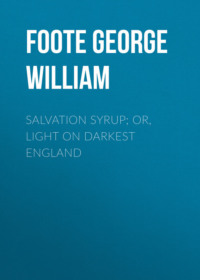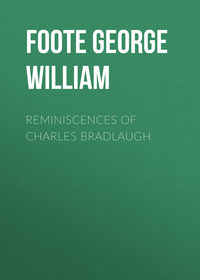 полная версия
полная версияFlowers of Freethought (Second Series)
We sincerely pity that Lincolnshire farmer. It is very hard lines to receive only thirteen and fourpence for four tons of potatoes; and harder still to pay the whole of that sum, and a good deal more, for attempting to obtain compensation. The poor man is absolutely without a remedy. The person who delayed and rotted his potatoes is called God, but no one knows where he resides, and it is impossible to serve a summons upon him, even if a court of justice would grant one. God appears to be the chartered libertine of this planet. He destroys what he pleases, and no one is able to make him pay damages.
Christians may call this "blasphemous." But calling names is no argument. Certainly it will not pay for that farmer's potatoes. We fail to see where the blasphemy comes in. An English judge and jury have accepted the Great Northern Railway Company's plea that the fog was the act of God. We simply take our stand upon their verdict and judgment. And we tell the Christians that if God sent the fog – as the judge and jury allow – he has a great deal more to answer for than four tons of rotted potatoes. That terrible fog cost London a gas bill amounting to twenty or thirty thousand pounds. It is impossible to estimate the cost to the community of delayed traffic and suspended business. Hundreds of people were suffocated or otherwise slaughtered. Millions of people were made peevish or brutally ill-tempered, and there was a frightful increase of reckless profanity.
Many persons, doubtless, will say that God did not send the fog. They will assert that it came in the ordinary course of nature. But does nature act independently of God? Is he only responsible for some of the things that happen? And who is responsible for the rest?
Those who still believe in the Devil may conveniently introduce him, it is curious, however, that they never do, except in cases of moral evil. Criminal indictments charge prisoners with acting wickedly under the instigation of the Devil. But physical evil is ascribed to Jehovah. Bills of lading exonerate shipowners from liability if anything happens to the cargo through "the act of God or the Queen's enemies." Old Nick does not raise storms, stir up volcanoes, stimulate earthquakes, blight crops, or spread pestilence. All those destructive pastimes are affected by his rival. Even cases of sudden death, or death from lightning are brought in by jurors as "died by the visitation of God." Which seems to show that a visit from God is a certain calamity.
The time will come, of course, when all this nonsense about "the act of God" will disappear. But it will only dissappear because real belief in God is dying. While men are sincere Theists they cannot help seeing God in the unexpected and the calamitous. That is how theology began, and that is how it must continue while it has a spark of vitality. But theology declines as knowledge increases. Our dread of the unknown diminishes as we gain command over the forces of nature; that is, our dread of the unknown diminishes as we turn it into the known.
"The act of God" is to be frustrated by Science. We cannot prevent storms, but we are growing more able to foresee them. We cannot prevent the angry waves from rising, but we can build ships to defy their fiercest wrath. We cannot prevent mist from ascending in certain conditions of sky and soil, but we can drain low-lying ground, and prevent the mist from being fatally charged with smoke. We cannot abolish the microbes with which our planet swarms, and if we could we should be surrounded with intolerable putrifaction; but we can observe the laws of public and private sanitation, maintain a high state of vitality, and make ourselves practically invulnerable.
Science is the instrument for achieving the triumph of man. Ultimately it will subdue the planet for us, and we shall be able to exclaim with Mr. Swinburne, "Glory to man in the highest, for man is the master of things." The paradise the theologians dream of will be realised on earth. We shall not abolish death, but we shall make life strong, rich, and glorious, and when death comes it will bring no terror, but rest and peace in the shadow of its wings.
Meanwhile "the act of God" will to some extent survive in the mental life of the multitude. All prayer is based upon this superstition. Those who pray for relief or exemption from storm, famine, or disease; those who pray to be preserved from "battle, murder, and sudden death"; those who pray to be saved from any evil, are, all praying against "the act of God." It is God who is sending the mischief, and therefore he is begged to take it away or pass it on to other persons. Hamburg would be grateful to God even if he transferred the cholera to Berlin. Thus do ignorance and selfishness go hand in hand; thus does superstition cloud the intellect and degrade the character.
KEIR HARDIE ON CHRIST
For some time the Labor leaders have been assiduously courted by the Churches. It is reckoned good business to have one on exhibition at Congresses and Conferences. Ben Tillett is in frequent request as a preacher. Tom Mann, who was once heterodox, is now declared by the Christian Commonwealth to be a member of a Christian Church. "We are not aware," our contemporary says, "that John Burns is opposed to the religion of Jesus Christ."
This appropriation of the Labor leaders is an excellent piece of strategy. Churches have seldom had the harmlessness of doves, but they have generally had the cunning of serpents. They often stoop, but always to conquer. And this is precisely what they are doing in the present case.
A year or two ago a leading Socialist, who is also an Atheist, remarked to us how the clericals were creeping into the Socialist movement. "Yes," we observed, "and they will appropriate and stifle it. They will talk about the Socialism of Jesus Christ, bamboozle your followers, and get them out of your control. Then the Socialism will gradually disappear, and Jesus Christ will be left in sole possession of the field. The clericals, in fact, will trump your best cards, if you let them take part in the game."
We warn the Labor leaders, whether they listen to us or not, that they are coquetting with the historic enemy of the people. All religion is a consecration of the past, and every minister is at heart a priest. The social and political object of Churches is to keep things as they are; or, if they must be altered, to control the alteration in the interest of wealth and privilege. Fine words may be uttered and popular sentiments may be echoed; but history teaches us that when the leaders of religion talk in this way, they are serving their one great purpose as surely as when they curse and damn the rebellious multitude.
The course of events will show whether we are right or wrong. Meanwhile let us "return to our sheep." Not that Mr. Keir Hardie is a sheep. We don't mean that, though he is certainly being attended to by the wolves.
Mr. Keir Hardie has been interviewed by the Christian Commonwealth. "His father," we are informed, "is a very vigorous and militant Atheist, so that the son was brought up without any religious belief." To some extent we believe this is true. Mr. Hardie's brother, and another member of the family, attended our last lectures at Glasgow. But we do not understand that Mr. Keir Hardie was ever a professed Atheist, or a member of any Freethought society. The scepticism he was "weaned from" by the Evangelical Union Church could hardly have been of a very robust order. He seems to have imbibed a sentimental form of Christianity as easily and comfortably as a cat laps milk.
During his last election contest the statement was circulated that Mr. Keir Hardie was an Atheist. "Whereupon," we are told, "Dr. James Morison, the venerable founder of the Evangelical Union, and Dr. Fergus Ferguson, of Glasgow, both wrote in the most eulogistic terms to a local clergyman as to Mr. Hardie's moral character and religious work in Scotland." This is extremely affecting. It is good to see parliamentary candidates walking about with certificates of moral character – written out by a local minister. It is also reassuring to find that such a certificate is an absolute answer to the charge of Atheism, No doubt Mr. Keir Hardie will print the testimonial as a postscript to his next election address at West Ham.
Mr. Keir Hardie calls himself a Christian. He does not say, however, if he believes in the supernatural part of the Gospels. Does he accept the New Testament miracles? Does he embrace the Incarnation and Resurrection? If he does, he is a Christian. If he does not, he has no more right to call himself a Christian than we have to be designated a Buddhist or a Mohammedan.
The Christianity of the schools, Mr. Keir Hardie says, is dead or dying. By this he means "the old theological sects." But here we should like him to be more explicit. Does he think there can be a Christianity without "theology"? Or does he mean that the "sects" comprise all persons who have more theology than himself?
But if the Christianity of the schools is dead or dying, the "humanitarian Christianity of Christ is again coming to the front." Now what is this humanitarian Christianity of Christ? Upon this point Mr. Keir Hardie throws but a single ray of light. "The whole of Christ's teachings and conduct," he says, "proves that he was intensely interested in the bodily welfare of those with whom he came in contact as a preparative to their spiritual well-being." This is a clear statement; all we now want is the clear proof. Mr. Keir Hardie should give it. We believe he cannot; nay, we defy him to do so. It is idle to cite the so-called "miracles of healing." They were occasional and special; they had as much effect on the "bodily welfare" of the Jewish people as tickling has on the gait of an elephant; and as for their being a "preparative to spiritual well-being," we may ask the "humanitarian Christians of Christ" to tell us, if they can, how much of this quality was afterwards displayed by the ladies and gentlemen who were the lucky subjects (or objects) of Christ's miracles. Mr. Keir Hardie might also recollect that the said miracles, if they ever happened, are of no "bodily" importance to the present generation. Humanitarians of to-day are unable to work miracles; they have to sow the seed of progress, and await its natural harvest.
Mr. Keir Hardie is undoubtedly an earnest social reformer. We wish him all success in his efforts to raise the workers and procure for them a just share of the produce of their industry. Some of his methods may be questionable without affecting his sincerity. If we all saw eye to eye there would be no problems to settle. What we object to is the fond imagination that any light upon the labor question, or any actual social problem, can be found in the teachings of Christ. Jesus of Nazareth never taught industry, or forethought, or any of the robuster virtues of civilisation. On one occasion he said that his kingdom was not of this world. He might certainly have said so of his teaching. It is all very well for Mr. Keir Hardie to assert that our "industrial system is foreign to the spirit of Christianity." What is the spirit of Christianity? Twenty different things in as many different minds. Some industrial system is a necessity, and whatever it is you will never find its real principles in the Gospels. Christ's one social panacea was "giving to the poor," and this is the worst of all "reformations." It only disguises social evils. The world could do very well without "charity" if it only had justice and common sense.
Charles Bradlaugh, the Atheist, was laughed at for advocating the compulsory cultivation of waste lands. He wanted to see labor and capital employed upon them, even if they yielded no rent to landlords. Mr. Keir Hardie, the Christian, also desires to bring the people into "contact with nature and mother earth," though his recipe, of "open spaces laid down in grass" seems ludicrously inadequate. The loss of this contact, he told his interviewer, is "accountable for much of the Atheism which is a natural product of city life." This "tender thought" was spoken in a voice "which sank almost to a whisper." Very naturally it struck the interviewer as "the finest and most beautiful of Mr. Hardie's utterances."
Both the interviewer and Mr. Keir Hardie forgot a fact of Christian history. Christianity spread in the towns of the Roman Empire. The pagans were the villagers —paganus meaning a countryman or rustic. Possibly some of the pagans said to themselves, "Ah, this Christianity is a natural product of the towns."
The diagnosis is in both cases empirical. In a certain sense, however, Mr. Keir Hardie has touched a truth. Progressive ideas must always originate in the keen life of cities. But in another sense Mr. Keir Hardie is mistaken. He seems to regard Atheism as a city malady, like rickets and anemia. Now this is untrue. It is also absurd. Mr. Keir Hardie would find a good many of these "afflicted" Atheists able to make mincemeat of his "humanitarian Christianity of Christ." He would also find, if he cared to look, a great many of them in the Socialist camp. It would be rare sport to see Mr. Keir Hardie defending his "new school" Christianity against the young bloods of the Fabian Society, though it might necessitate the interference of the Society for the Prevention of Cruelty.
But we do not wish to part from Mr. Keir Hardie in a spirit of sarcasm. If he is a hopeless sentimentalist there is no more to be said; but, if he is capable of reason in matters of religion, we appeal to him, in all sincerity, not to press the new wine of Humanitarianism into the old bottles of Christianity. He will only break the bottles and lose the wine. We also implore him to cease talking nonsense about Christianity being "a life, and not a doctrine." It never can be the one without the other. Finally, we beg him to consider what is the real value of Christianity if, after all these centuries, it is necessary to put "humanitarian" in front of it, in order to give it a chance in decent society.
BLESSED BE YE POOR
A leading London newspaper, the Daily Chronicle, has recently opened it columns to a discussion of the question, "Is Christianity Played Out?" Mr. Robert Buchanan thinks that it is, and we are of the same opinion. But in a certain sense Christianity is not played out. To use a common expression, "there's money in it." That is incontestable. Despite the "poverty" of the "lower clergy," for whom so many appeals are made, the clerical business beats all others, if we compare the amount of investment with the size of the dividend. Relatively speaking, the profits are magnificent. There are curates with only a workman's wages, and of course they merit our deepest sympathy. It is quite shocking to think that a disciple of the "poor Carpenter of Nazareth" has to subsist, and support his ten children, on such a miserable pittance. It is a calamity which calls for tears of blood. But, on the other hand, there are Archbishops with princely incomes, Bishops with lordly revenues, Deans and Canons with fine salaries and snug quarters; and between the two extremes of the fat bishop and the lean curate is a long line of gradations, in which, if we strike an average, the result is very far from despicable. It may be added that while the leading Nonconformist ministers, at least in England, do not rival the great Church dignitaries in the matter of income, they often run up to a thousand a year and sometimes over it. Taking the average of their incomes, we have no hesitation in saying it is beyond what they would earn in the ordinary labor market. Still, so far as they are not paid by the State, as the Church clergy are, we have no personal reason for complaint. This is a free country – especially for Christians; and if the lay disciples of the poor Carpenter like to pay his professional apostles a fancy price for their work, it is no concern of ours from a business point of view. Nevertheless, as the said apostles are public men, who set up as other people's teachers, we have a right to express an opinion as to the consistency between their preaching and their practice.
Our gallant colleague, Joseph Symes, who is nobly upholding the Freethought banner in Australia, once asked, "Who's to be Damned if Christianity is True?" Certainly, he said, the clergy stand a fine chance. They are more likely to go to Hades than the congregations they preach to. On on average they are better off. They preach, or should preach, the blessings of poverty, and the curse, nay, the damnableness, of wealth. According to the teaching of Jesus, as we read it in the Sermon on the Mount, and as we find it illustrated in the parable of Dives and Lazarus, every pauper is pretty sure of a front seat in heaven; and every man of property or good income is equally sure of warm quarters in hell. But you do not meet parsons in workhouses, though some of them get a good deal of outdoor relief. Go into a country parish and look for the clergyman's house; you will not find it difficult to discover. The best residence is the squire's, the next best is the parson's. Everywhere the clericals appropriate as much as they can of the good things of this world. They find it quite easy to worship God and Mammon together. The curate has his eye on a vicarage; the vicar has his on a deanery; the dean has his on a bishopric. The Dissenting minister is open to improve his position. Sometimes he is invited to another church. He wrestles with the Lord, and makes inquiries. If they prove satisfactory, he recognises "a call." Other people, in ordinary business, would honestly say they were accepting a better situation; but the man of God is above all that, so he obeys the Lord's voice and goes to a position of "greater service," though it would puzzle him to show an extra soul saved by the exchange. Yes, the poor Carpenter's apostles strive to make the best of this world, and take their chance of the next. They are wise in their generation; they resemble the serpent in the text, however they neglect the dove. And for all these things God shall bring them into account – that is, if the gospel be true; for nothing is more certain, according to the gospel, than that the poor will be saved, and those who are not poor will be damned.
Benjamin Disraeli called the Conservative government of Sir Robert Peel "an organised hypocrisy." Modern Christianity appears to us to merit the same description. The note of modern apologetics is the phrase of "Christ-like." In one respect the gentlemen who strike this note are Christ-like. They live on the gifts of the faithful, including those of "rich women." But the likeness ends there. In other respects they are dissimilar to their Master. He died upon the cross, and they live upon the cross. Yes, and many of them get far more on the cross than they would ever get on the square.
Doubtless we shall be censured in vigorous biblical language for speaking so plainly. But we mean every word we say, and are prepared to make it good in discussion. Men should practise what they preach. Those who teach that poverty is a blessing should themselves be poor. Those who teach that God Almighty cried "Woe unto you rich!" should avoid the curse of wealth. If they do not, they are hypocrites. It is no use mincing the matter. Plain speech is best on such occasions. When the great Dr. Abernethy told a gouty, dyspeptic, rich patient to "live on sixpence a day and earn it," his advice was more wholesome than the most dexterous rigmarole.
Nothing could better show than the conduct of the clergy that Christianity is played out, if it means the teaching of the Sermon on the Mount. Those who preach it cannot practise it; what is more, they do not mean to. The late Archbishop of York, while Bishop of Peterborough, wrote a magazine article on this Sermon on the Mount, in which he urged that any Society that was based upon it would go to ruin in a week. He was paid at that time £4,500 a year to-preach this Sermon on the Mount, and he did so – in the pulpit; then he mounted another rostrum, and cried, "For God's sake don't practise it."
"Blessed be ye poor" and "Woe unto you rich" are texts with which the Church has bamboozled the multitude in the interest of the privileged classes. The disinherited sons of earth were promised all sorts of fine compensations in Kingdom-Come; meanwhile kings, aristocrats, priests, and all the rest of the juggling and appropriating tribe, battened on the fruits of other men's labor. The poor were like the dog crossing the stream, and seeing the big shadow of his piece of meat in the water. "Seize the shadow!" the priests cried. The poor did so. But the substance-was not lost. It was snapped up and shared by priestcraft and privilege.
The people have been told that the gospel is a cheap thing – without money and without price. That is the prospectus. But the gospel is frightfully dear in reality. Religion costs more than education. England spends more in preparing her sons and daughters for the next world than in training them for this world. Yet the next world may be nothing but a dream, and certainly we know nothing about it; while this world is a solid and often a solemn fact, with its business as well as its pleasures, its work as well as its enjoyments, its duties as well as its privileges. To keep people out of hell, and guide them to heaven (places that only exist in the map of faith), we spend over twenty millions a year. This is a sum which, if wisely devoted, would remedy the worst evils of human society in a single generation. It would found countless institutions of culture and innocent recreation; and, by means of experiments, it would solve a host of social problems. Instead of doing this, we keep up a huge army of black-coats to fight an imaginary Devil; yet we call ourselves a practical people. Christianity has it roots-deep down in the wealth of England, and this is the secret of its power, allied of course with its usurped authority over the minds of little children. The-churches and chapels are mostly social institutions, Sunday resorts of the "respectable" classes. For any purpose connected with the real welfare of the people Christianity might just as well be dead and buried – as it will be when the people see the truth.
CONVERTED INFIDELS
Christian logic is a curious thing. There is nothing like it, we should imagine, in the heavens above or the waters under the earth. Certainly there is nothing like it on the earth itself, unless we make an exception in the case of Christian veracity, which is as much like Christian logic as one cherry is like another.
It is a long time since Christians began arguing – it would be an outrage on the dictionary to call it reasoning. They have been at it for nearly two thousand years. Their founder, Jesus Christ, seldom argued. He uttered himself dogmatically at most times; occasionally he spoke in parables; and whenever he was cornered he escaped on a palpable evasion. His great disciple, Paul, however, was particularly fond of arguing. His writings abound in "for" and "whereas." The argument he most affected was the circular one. He could run round a horseshoe, skip over from point to point, and run round again as nimbly as any man on record. In a famous chapter in Corinthians, for instance, he first proves the resurrection of the dead by the resurrection of Jesus Christ, and then proves the resurrection of Jesus Christ by the resurrection of the dead. It is in the same chapter that he enunciates the botanical truth (a truth of Bible botany, observe) that a seed does not bear anything unless it dies. Altogether the great Apostle is a first-rate type of the Christian logician, and there are some who declare him to be a first-rate type of the Christian truth-teller.
Speeding down the stream of time to the present age, we see that Christian logic (yes, and Christian veracity) has undergone little if any alteration. It is as infantile and as impudent as ever. Arguments that would look fallacious in the nursery are used in the pulpit, generation after generation, with an air of solemn profundity, as though they were as wise as the oracles of omniscience. To select from such a plethora is almost impossible; the difficulty is where to begin. But happily we are under no necessity of selection. A case is before us, and we take it as it comes. It is a "converted infidel" case, in the report of a recent sermon – the last of a series on "Is Christianity Played Out?" – by the Rev. Dr. Hiles Hitchens; the gentleman referred to in one of our last week's paragraphs as wishing for an old three-legged stool or something made by Jesus Christ. Dr. Hitchens, alas! cannot find the stool, and has to put up with the creed instead; though, perhaps, he gets as much out of the creed as he would make by selling the stool to the British Museum.









